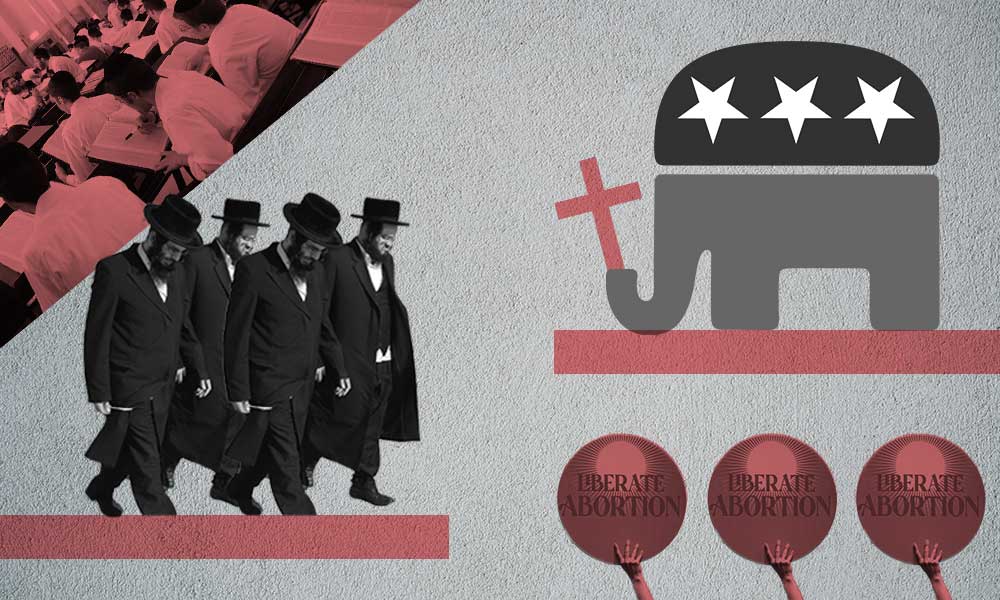Abortion Rights: Where Jewish Ultra-Orthodox and Christian Conservatives Meet


Jewish Politics & Power is published every other week. Sign up for our newsletter for updates.
1. Roe at 50: how the Haredi community broke off
America on Sunday marked 50 years since the Supreme Court’s landmark Roe v. Wade decision, which ensured the right to abortion. It was a sad anniversary, with little to celebrate. Last year, Roe was overturned, and instead of spending the day marking the progress the nation has undergone since 1973, American women and men who believe in the right to choose found themselves marching, protesting, organizing and strategizing their next moves, in the hope of regaining their lost right.
Also on Sunday, the documentary Under G-d premiered at the Sundance film festival. The movie follows key Jewish activists, including a Florida rabbi, in their struggle against the revocation of Roe v. Wade and their claim that prohibiting access to abortions infringes on Jewish women’s right to religious freedom, since Judaism permits abortions in most cases.
This sentiment echoes the views of the majority of American Jews (83 percent, according to Pew Research) and while most do not approach the issue from a religious standpoint, they have clearly sided with those who oppose limitations on women’s access to legal abortions.
But not all are on board.
The ultra-Orthodox, or Haredi, groups within the Jewish American community have stood out in support of the Dobbs v Jackson Women’s Health Organization decision and in their endorsement of revoking the legal right to abortion. Agudath Israel of America, the political umbrella group representing Haredi interests in America, welcomed the move, explaining that the Jewish faith, while accepting the need for abortions in cases of danger to the mother or the fetus’s life, opposes ending pregnancies on the grounds of economic or social difficulties. This notion, argued Agudath’s director of public affairs, Rabbi Avi Shafran, is not an adoption of a conservative Christian agenda but rather is in adherence to the values of the Torah and teachings of Jewish sages.
Ultra-Orthodox Jews make up approximately 6 percent of Jewish Americans and, given their geographical concentration (primarily in New York and New Jersey), are not positioned to make a real difference in the national political balance.
Yet their view on abortion has drawn attention, especially in the past year, ever since the Supreme Court’s decision galvanized the majority of the Jewish community in opposition to the ruling and turned abortion into Jewish voters’ top concern.
Agudath’s move has drawn attention in part because of its power to demonstrate the wide array of opinions within the Jewish community, even on this issue, and in part due to the hope it raises among conservatives of a possible alliance between Orthodox Jews and Christian conservatives.
2. Where goals meet, where they don’t
Politically, the Haredi community has real differences in priorities from other groups in the Jewish community, but it also shares many concerns and interests with them.
Abortion rights are, as of now, the most significant issue distinguishing ultra-Orthodox from other members of the Jewish community. On the topic of education, the Haredi community’s advocacy work on local, state and federal levels seeks to increase funding for their parochial education system and support greater funding allocations for private schools. Most non-Orthodox Jews, however, prefer keeping the government out of their education system, even if it means making the cost of Jewish education prohibitive for many.
On the other hand, ultra-Orthodox groups are on the same page as most other organizations in the Jewish community when it comes to supporting increased federal funding for security of synagogues and Jewish communal institutions through the Department of Homeland Security’s nonprofit grant program. This speaks to the greater concern that unites all members of the Jewish community—the threat posed by increased antisemitic violence in the United States. Last month, representatives of Agudath and of Chabad-Lubavitch were invited to participate in the first-ever White House roundtable on antisemitism, headed by Second Gentleman Doug Emhoff, reinforcing their equal standing as representatives of Jewish Americans facing increased antisemitic threats.
3. The Haredi community’s unique antisemitism: being “visibly” Jewish
While concerns of growing anti-Jewish violence cross denominational boundaries, ultra-Orthodox activists point out one important difference. Haredi Jews, for better or worse, are more “visibly Jewish” than other members of the Jewish community. Their dark suits, black hats and beards distinguish Haredi Jewish men and, as has been the unfortunate case in recent years in Brooklyn, have made them easy targets for antisemitic street attacks. Ultra-Orthodox Jews are still prone to the same types of violence that other Jews suffer, including domestic terror attacks on synagogues and Jewish institutions, swastika painting, vandalism and harassment. But they’re pretty much the only members of the Jewish community who face real fear when simply walking down the street in their neighborhoods. (At times of increased tension, some Modern Orthodox Jews have opted to wear a baseball cap or other hat over their kippah, an option that is not available to Haredi Jews.)
This unique concern also points to the need for different solutions: For ultra-Orthodox Jews, synagogue security fortification is not enough. They also need increased law enforcement presence on the streets. And while much of the focus has been directed to antisemitism perpetrated by white nationalists, the Haredi community has had to deal with cases of street abuse and violence carried out by young Black men.
4. Shifting voting patterns
The Haredi-conservative Christian alignment is not as obvious as it may seem at first sight.
True, ultra-Orthodox Jews adhere to traditional values and are likely to side with conservative views on many issues, such as opposing expansion of LGBTQ equality or favoring a lower wall separating church and state.
But in the past, the Haredi community’s political route was less committal. Alongside ideological similarities with Republicans and Chrisitan conservatives, they also looked to their nearby surroundings and made political decisions based on local and statewide realities. Haredi leaders in New York forged strong alliances with city and state Democratic officials who were in control of their neighborhoods. These Democrats may have differed with ultra-Orthodox Jews on some core beliefs, but they understood the need to communicate with and address their needs as constituents.
In the past decade, or perhaps even earlier, the Haredi-conservative Christian alliance grew stronger. It may be attributed to growing partisan extremism on all levels and to the increased role played by political identification on lower levels of government, including local authorities and even school boards. The issue of Israel has also helped drive Haredi Jews closer to the Republican side (starting with Chabad in Israel, then followed by concerted efforts by GOP politicians, including Donald Trump, who courted the community and won a majority of its votes.)
5. Taking on the NYT
For the ultra-Orthodox community, the past few months offered a new type of challenge: battling the media. Activists were alarmed to see the in-depth exposé on the front page of The New York Times investigating the yeshiva education world. The article, and several follow-up pieces published in recent months, highlighted the lack of core secular studies in Haredi boys’ yeshivas in New York and questioned their funding eligibility.
Agudath and other ultra-Orthodox activists felt the powerful publication had wrongfully singled out the community. They sought to push back by running ads decrying what they viewed as double-standard reporting and by launching a Know Us billboard campaign pointing out the increase in antisemitic attacks in New York against Orthodox Jews.
In the real world, there’s no way a local ad campaign run by Agudath Israel will offset the impact of The New York Times’ reporting on the community. But Haredi leaders felt the need to act, and they felt hurt—both because of their conviction that the articles misrepresented the community and also because they sensed a deep unfairness in zeroing in on the faults of the Haredi education system at a time when members of the community are struggling with increased antisemitic violence and fear of stepping out on the street.
Opening Image: Ted Eytan (CC BY-SA 2.0) / Matanya via Wikimedia / BBC World Service via Flickr (CC BY-NC 2.0)

5 thoughts on “Abortion Rights: Where Jewish Ultra-Orthodox and Christian Conservatives Meet”
What about safety of Haredi •women•?? — and
how is the failure of the schools to be ignored or forgiven because of antisemitism threats?!
This article seems incomplete. It leaves unanswered the specific halachic basis for Agudath Israel of America’s perspective. How do those views of halacha compare with other movements, and why do they differ?
women, rights, are you joking?
The Orthodox and conservative Christian movements meet on common ground for good reason. They both believe in the God-inspired (G-d) Hebrew /Judeo-Christian Bible (Tanakh)…that it is the inspired, infallible Word of God. It is clear to both groups the these scriptures reject the act of abortion, which is an abominable practice of the pagan cultures that used to occupy the Holy Land, better known in ancient times as Canaan, then, and now, Israel. It surprises some of us that such practices gain popularity over a long period of time, when morals change and relax in increments. However, the God of Israel never changes. He is the same yesterday, today and forever. Reading His Word daily throughout the texts re-enforces His law, His love and regard for His creation…us. All life is sacred to God and those that believe and follow Him. The unborn are the most innocent of life…each made in His image. We hear much about animal cruelty and neglect, and for good reason we should care. But human life is the most sacred. Abortion practices are cruel, crude and inhumane. Just watch the movie: “Unplanned” and not be moved emotionally to your core. It can be life-changing. It was for her.
Was the NY Y reporting on haredi schools accurate or not? If not, in what specifics?